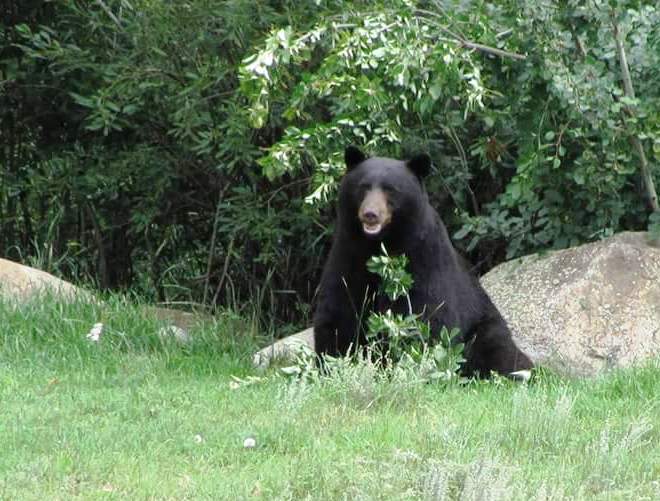What is that sound?
I felt annoyed at being unable to identify who was screaming.
It was a moonless night. Traffic was stopped in both directions, with the exception of the one driver, unconcerned with the reasons for complete cessation of movement on the stretch of highway between remote mountains and urbanity—Boulder Canyon, Colorado.
I stared into the ditch, visually scouring the mountainsides. For a body or a prone creature lying in the gravel beneath granite cliffs of the canyon walls.
Somewhere, he must be somewhere. I couldn’t train my eyes on him.
The man standing next to me on the shoulder spoke up quietly. “It’s the cub,” he stated simply. My consciousness caught up to me in the tragedy of the moment. Sometimes in trauma, it takes time to realize the reality right in front of you.
The bear cub, his sibling, and their mama had just been down in our mountain valley, looking for trash on which to feed. Then they’d run from the valley, up the hill, toward other places—ones more amenable to and less aware of their behaviors. They ran right across the stretch of highway between Boulder and Nederland, a highway of posted speed limits between 40 to 45 mph. Ran right across the motorized path of a woman making her way home after her own long attempt to eke out a living.
The bears have been attempting to eke out their own living on the abundance of human discards. Some people in the mountain community have been making it easy for them.
Trashcans—not all of them bear proof—are routinely left unlocked. Refuse is dragged out at the end of the driveway for the morning pickup as the last act before turning into bed. Food scraps litter the ground. Bird feeders hang in trees while residents slumber. Transients on West Magnolia Road campground leave spaghetti cooking in pots on illegal, unattended campfires, and bags of potato chips and Cheetos in their broken-into vehicles.
People down in the gilded City of Boulder complain of monetary fines for trash left for bears, protesting they don’t want to awake at 5:00 a.m. to haul their trash to the curbside. They protest loudly that the responsibilities for mitigating human impact upon wildlife are far too inconvenient for them to bear.
These are times of climate change.
Bears, too, are squeezed into diminished existence. Long gone are the days of abundant food supply. In its place, they are finding fragmented habitats, fancy homes, garages, and driveways where wilderness once stood. Encroachment of humanity into urban-wildlife corridors means bears are lured in by easy food sources. Nothing is more appealing to a starving bear than the sugary, fatty discards of our human existence.
I walked over to the woman sitting in her car. I could see spattered blood on the bumper and quarter panel.
“Are you hurt?” I asked.
“No, he—he just—” She began to cry.
Bleh! Bleh! Bleh! I looked over at the bear cub. Some of the eeriest sounds come from the mouths of animals in distress. As the cub stood crying and shifting his weight from paw to paw, I joined him in the visual search for his mama and sibling. A pool of blood on the highway informed the extent of his injury.
I walked back to a stopped car. I announced, “We’re trying to help an injured bear cub hit on the road, please—just go past slowly.”
Bleh! Bleh! Bleh! The bear’s cries loomed in the backdrop.
I looked back up to the scene on the highway and at my husband. He was standing on the shoulder next to the guy who’d informed me of the cub’s location. He was looking around in the darkness for something he wasn’t going to find. Explanations are hard things to locate when the best of efforts have failed.
I’ve lived in the valley for half a lifetime. My husband joined me not long ago. Together, we house our trash in a bear proof can along with the recycling in a Tuff Shed far from our home. We’re frequenters at the county dump. He brings in the bird feeders each night and puts them out at 5:00 a.m. every morning. We haze bears (scare them away) when they do show up—because we realize they are becoming habituated somewhere nearby, and we are intent on discouraging that from happening in our own valley.
Just then, red and blue rescue lights joined the yellowish headlights. I inhaled.
Bleh! Bleh! Bleh!
The officer walked over.
I stared up into the darkness, tracing the outline of the ridge to the north of us. Golden stars jeweled the sky. It was bare of any larger bear profile, of a mama waiting on her injured, lost, and distressed cub. The one that had been trailing behind as they fled across the dark highway. The last one—the slowest one, perhaps—to get caught in the wheels of the oncoming motorist.
I prayed the officer’s revolver would stay snapped in his holster.
I explained to him that we lived in the valley. That we’d heard the sound—that sickening sound—of an animal being hit by a car. That we’d come running. That the bears had just been down our way.
He looked at me, blankly. “Is anybody hurt?” he asked.
“Not that I can tell,” I responded.
Nederland emergency and fire trucks appeared. “Any injuries here?”
Just the bear cub—I held my tongue. I worried the office might end the cub’s opportunity to heal and survive into another day far too quickly.
Bleh! Bleh! Bleh! I could see in his eyes he was growing desperate.
I walked back across the highway. The police waved on patient motorists.
Just then, the bear cub stopped crying. He turned and ascended up toward the mountain ridge where we thought his mama might be waiting. I could see in the headlights that the inside of his left front leg was bleeding profusely. Blood dripped on the rocks fronting the ridge.
It will take a while to wash away the memory of that evening. It will take a rainstorm to wash away the blood.
In the meantime, the bears in the mountain community will continue to endanger themselves by dining on the discards of humanity. Many people are drawn to mountain living for the immeasurable relief it provides from the ills of urbanity, for the beauty found in the landscape, for the peace of mind. Sadly, we do this without conscious awareness of the other inhabitants whose livelihoods cannot be made somewhere else, and those four-legged and winged creatures are often adversely impacted.
The vulnerability of bears is now readily apparent. We lost at least 168 bears last year in Colorado. People say it’s “bad bear habits.” It’s not—-it’s “bad people habits,” originating from human behaviors that can only be stated as lack of awareness or sheer inertia for the existence of bears.
We need better human “bear-havior.”
The cries of the bear cub have been lingering in the air like the darkness that hung over us all on that moonless night. Sometimes, the cries of an animal in distress are occasioned by acts of human intention. Yet in others, such cries are caused by conscious disregard. It takes awareness of the ways of other creatures to be able to live closely alongside them. It takes mindfulness of their habits—the environment in which they live, the conditions of that environment, and our own impact upon it—to afford them every opportunity to thrive in their own lives. Above all, it takes willingness and intention to adjust our own habits of living to accommodate others.
A bear’s existence is not separate from us, but intertwined therewith. In our endeavor to become more enlightened beings, we are responsible for our behaviors affecting other sentient beings.
The bears depend upon our doing this better. Once fearsome predators from which we fled, their existence has, paradoxically, become dependent upon our learning different ways of being in the world. They will continue to suffer and fatally decline at the hands of our laws and policies if we fail to take their needs and vulnerabilities into account.
Is it too much to ask to cultivate better “bear-havior”—before it’s too late?
~
Relephant:
How to Save a Bear’s Life.
~
Author: Denise Boehler
Image: Author’s Own
Editor: Catherine Monkman
Copy & Social Editor: Sara Kärpänen












Read 0 comments and reply